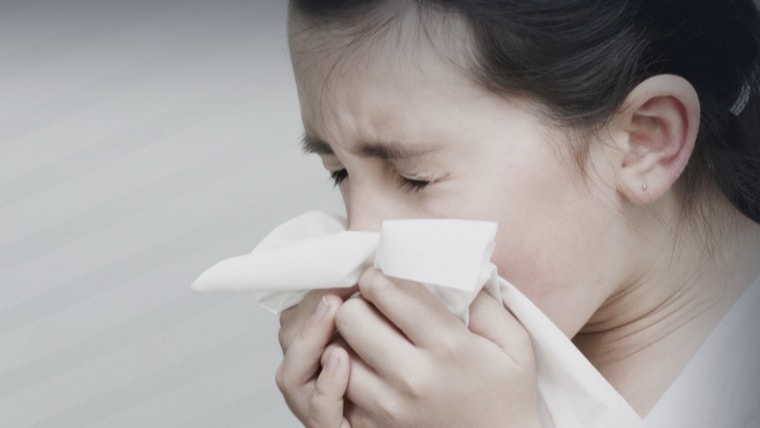This year's flu season has gotten off to a slow start, but cases are increasing in some areas of the country. At the University of Michigan, for instance, the Centers for Disease Control and Prevention is investigating a flu outbreak.
To date, there have been 528 cases of flu at the university. Since the first cases were reported the week of Oct. 6, the school counted 198 cases the week ending in Nov. 1 and 313 cases the week ending in Nov. 8.
The majority of cases were identified as H3N2, an influenza A strain. More than 77% of the cases occurred in people who were not vaccinated against the flu, the university said in a statement.
“Through prompt detection and collaboration with county and state health officials, as well as School of Public Health and Michigan Medicine researchers, we quickly identified these cases as influenza A(H3N2) virus infections,” Lindsey Mortenson, medical director and acting executive director of the school's University Health Service, said in the statement. “Partnering with the CDC will accelerate our understanding of how this flu season may unfold regionally and nationally in the setting of the COVID-19 pandemic.”
Flu activity is low in the U.S. right now, but increasing
Last year's flu season was unusually mild, likely due to a multitude of factors include the adoption of COVID-19 prevention strategies such as masks, hand-washing and social distancing. But it's not clear yet whether or not this season will follow a similar pattern. With COVID-19 vaccines available now, many areas of the country have forgone the coronavirus mitigation strategies that were common last flu season.
During the week ending in Nov. 6, the most recent week for which CDC data are available, seasonal flu activity was low. There was only one jurisdiction in which flu-like activity — which may include instances of respiratory syncytial virus (more commonly known as RSV) and other respiratory illnesses — was considered high (New Mexico) and one where flu activity was moderate (Rhode Island).
But it wasn't just masks and distancing that factored into last year's drastic drop in flu cases; higher than usual vaccination rates also played a role, the CDC explained. This season, however, early data indicate that vaccination rates are lagging among children and pregnant people, some of those most vulnerable to severe flu. In fact, more than 90% of flu cases detected so far this season are among children and young adults, the CDC said, and most are H3N2.
When it comes to what flu season might hold this year, it's "still not a very clear picture," Dr. Waleed Javaid, director of infection prevention and control at Mount Sinai Downtown in New York, told TODAY. "It's not clear which direction the flu season is going to go."
The numbers from the University of Michigan outbreak are "pretty dramatic," Javaid said, but he emphasized that the majority of people who have gotten infected there weren't vaccinated. And we know that taking basic precautions, such as getting a flu shot, can help prevent the spread of the virus.
You still have time to get your flu vaccine
The CDC typically recommends that adults get their flu shots by the end of October each year. But if you missed that deadline, it's still a good idea to get vaccinated. Although the flu season usually peaks in the late fall and winter, it can last into the spring — which means getting vaccinated now will still provide protection for the coming months.
The flu may seem like a minor illness, and for many otherwise healthy adults it is. But certain groups of people have a higher risk for developing severe complications due to the flu. That includes people with some underlying health conditions (such as asthma, diabetes, heart disease and kidney disease) as well as those over the age of 65, pregnant people and kids under the age of 2, the CDC said.
As with COVID-19, the best way to protect yourself and those around you from the flu is with vaccination. And the CDC recently announced that most people can safely get both a COVID-19 vaccine (including boosters) and flu vaccine at the same appointment.
Ideally, we should all be following CDC recommendations and common-sense health practices, Javaid explained. Of course, that means getting vaccinated. But it also means staying home when you're feeling sick, continuing to wear masks in high-risk environments, washing your hands frequently and getting tested — potentially for both flu and COVID-19 — if you start to feel symptoms.
"severe" - Google News
November 18, 2021 at 04:33AM
https://ift.tt/3wXRN4t
Could the University of Michigan outbreak signal a severe flu season? - Today.com
"severe" - Google News
https://ift.tt/2OrY17E
Shoes Man Tutorial
Pos News Update
Meme Update
Korean Entertainment News
Japan News Update
Bagikan Berita Ini
















0 Response to "Could the University of Michigan outbreak signal a severe flu season? - Today.com"
Post a Comment